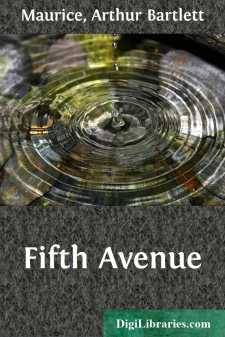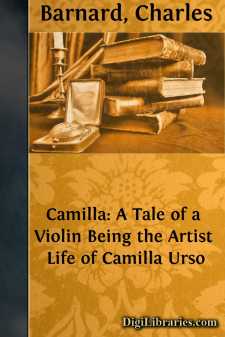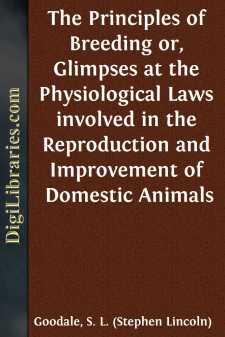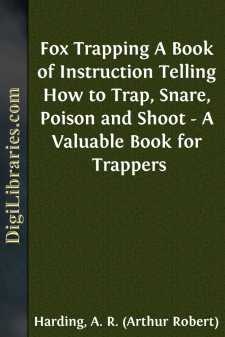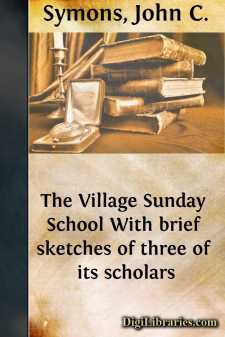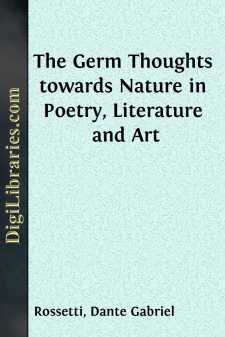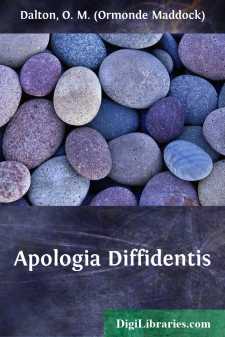Non-Classifiable
- Non-Classifiable 1768
Non-Classifiable Books
Sort by:
CHAPTER I The Shadow of the Knickerbockers Boughton, had you bid me chantHymns to Peter Stuyvesant.Had you bid me sing of Wouter.(He! the Onion-head! the Doubter!)But to rhyme of this one-mocker,Who shall rhyme to Knickerbocker?—Austin Dobson. Before the writer, as he begins the pleasant task, is an old half-illegible map, or rather, fragment of a map. Near-by are three or four dull prints. They are...
more...
PREFACE. "You are publishing a great and interesting national document.... The whole narrative is as fine, manly, and explicit an account as ever was given of so interesting a transaction." So wrote Sir Walter Scott to Captain Maitland after reading the manuscript of his Narrative of the Surrender of Buonaparte. It is undoubtedly a historical document of the first importance, not only as a...
more...
CHAPTER I. CHRISTMAS "Don't look! There, now it's done!" cried Bertha. It was two nights before Christmas. Bertha was in the big living-room with her mother and older sister. Each sat as close as possible to the candle-light, and was busily working on something in her lap. But, strange to say, they did not face each other. They were sitting back to back. "What an unsociable way to...
more...
by:
Charles Barnard
CHAPTER I.BEFORE DAWN. About thirty miles from the sea, on the River Loire, in France, stands the quaint, sleepy old town of Nantes. The Erdre and the Sevre, two smaller streams unite with the Loire just here and the town is spread out in an irregular fashion over the islands, the little capes between the rivers, and the hills that stand round about. The old part of the town is on the hill-side and...
more...
CHAPTER I. Introductory. The object of the husbandman, like that of men engaged in other avocations, is profit; and like other men the farmer may expect success proportionate to the skill, care, judgment and perseverance with which his operations are conducted. The better policy of farmers generally, is to make stock husbandry in some one or more of its departments a leading aim—that is to say, while...
more...
CHAPTER I.GENERAL INFORMATION. Foxes are found in all parts of America, but probably most numerous in the New England States and parts of Canada. The range of the red is from Virginia to Alaska; grey, Southern and Southwestern States; cross, Northern New Jersey to Manitoba; black, Alaska, and the territories several hundred miles to the South and East; swift, the prairies or Great Plains; white and...
more...
by:
John C. Symons
CHAPTER I. THE VILLAGE—THE NEW SUNDAY-SCHOOL—THE SUPERINTENDENT—A REVIVAL. M—— is a small village in the west of England, delightfully situated in a wooded pleasant valley. Through it runs the parish road, which—as it leads to the seashore, from whence the farmers of that and the neighboring parishes bring great quantities of sand and seaweed as manure—frequently presents, in the summer,...
more...
CHAPTER I THE TIMES AND THE MEN There was rejoicing throughout the Thirteen Colonies, in the month of September 1760, when news arrived of the capitulation of Montreal. Bonfires flamed forth and prayers were offered up in the churches and meeting-houses in gratitude for deliverance from a foe that for over a hundred years had harried and had caused the Indians to harry the frontier settlements. The...
more...
INTRODUCTION. Of late years it has been my fate or my whim to write a good deal about the early days of the Præraphaelite movement, the members of the Præraphaelite Brotherhood, and especially my brother Dante Gabriel Rossetti, and my sister Christina Georgina Rossetti. I am now invited to write something further on the subject, with immediate reference to the Præraphaelite magazine “The Germ,”...
more...
In the matter of avowals the diffident never speak if they can write. That is why my apology for a furtive existence is here set down in solitude instead of being told face to face. You have borne so many years with my unresponsive and incomprehensible ways that shame at last constrains me to this poor defence; for I must either justify myself in your sight, or go far away where even your kindness...
more...


